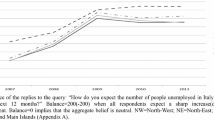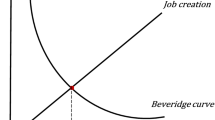Abstract.
This paper investigates the long-run relationship among new hiring, unemployment (job seekers), and unfilled vacancies in Japan, using an annual panel data on 47 prefectures for 1972-1999. We find that these three variables are I(1) processes, and are cointegrated in our panel data. Further, we estimate the panel cointegration equation derived from a Cobb-Douglas matching function by the heterogeneous fully modified OLS and heterogeneous dynamic OLS. The estimation results reveal that conventional within estimates could have non-negligible biases.
Similar content being viewed by others
Author information
Authors and Affiliations
Corresponding author
Additional information
First version received: November 2002/Final version received: October 2003
All correspondence to Shigeki Kano. The authors are grateful to the associate editor and two anonymous referees of this journal for helpful comments. Doctor Stephen J. Turnbull (University of Tsukuba) is also acknowledged for correcting English errors in this paper. Remaining errors are due to the authors. The data set and GAUSS programming code used in this paperare available upon request.
Rights and permissions
About this article
Cite this article
Kano, S., Ohta, M. Long-run matching relationship in the Japanese labor market. Empirical Economics 29, 921–937 (2004). https://doi.org/10.1007/s00181-004-0208-6
Issue Date:
DOI: https://doi.org/10.1007/s00181-004-0208-6




